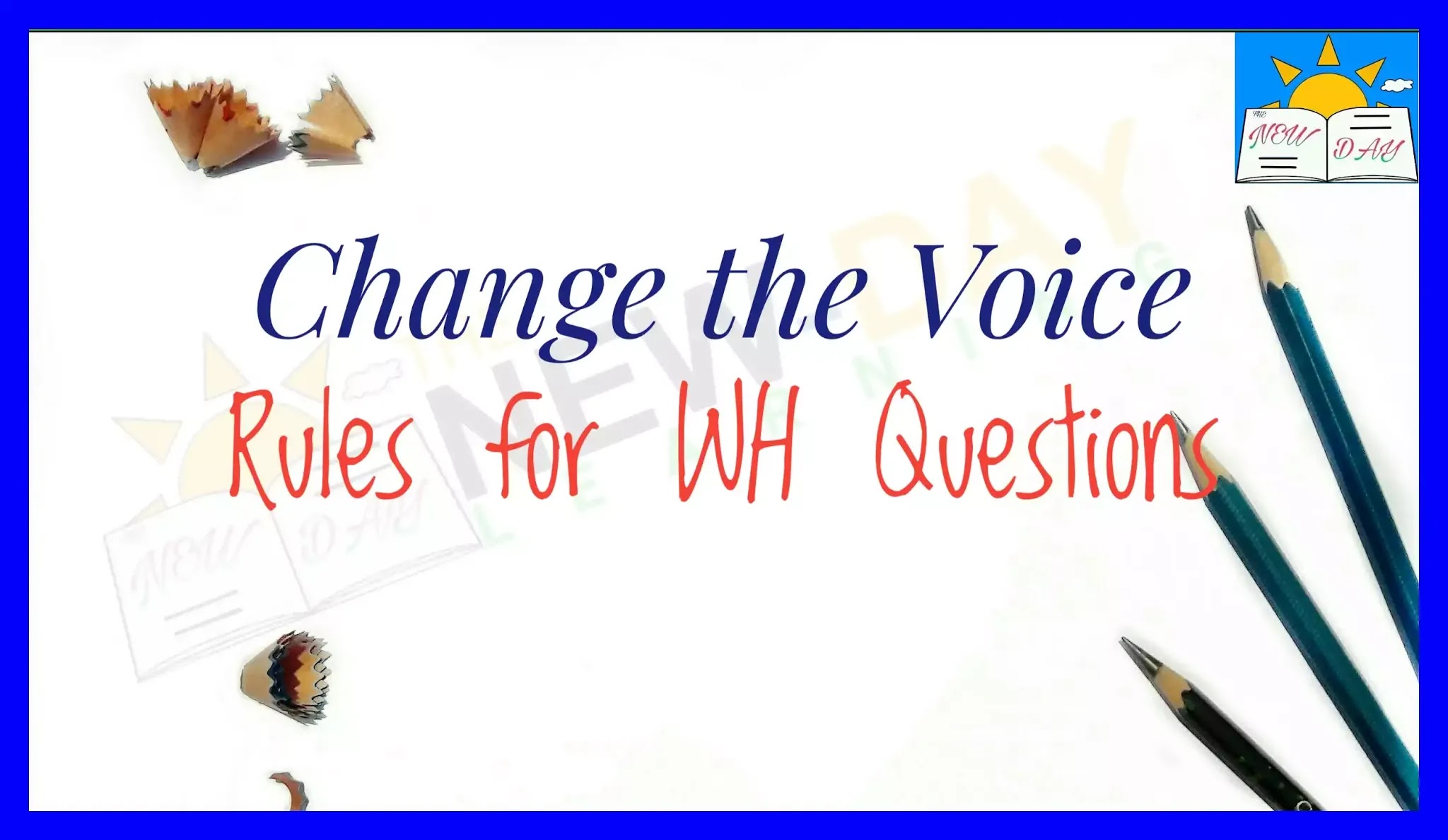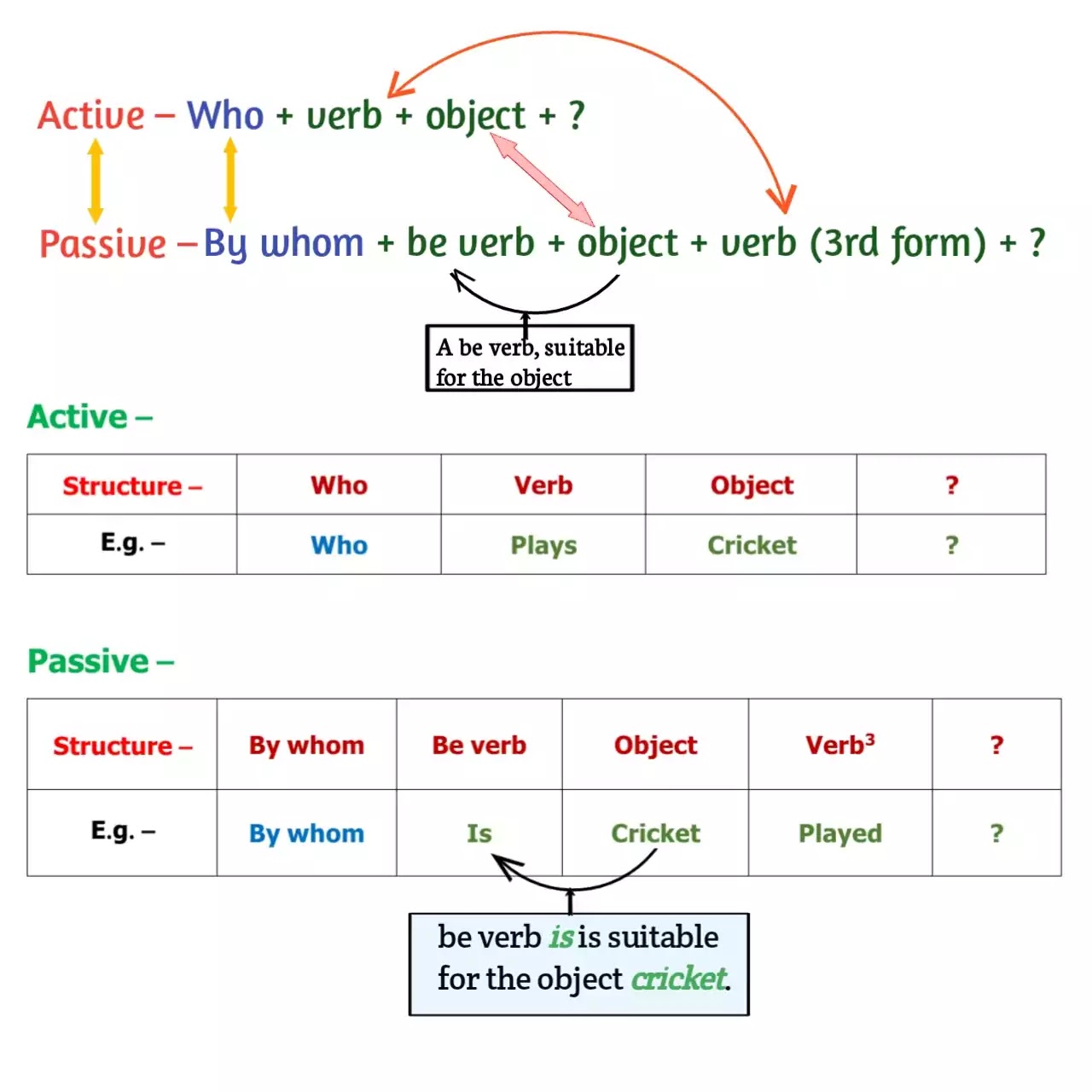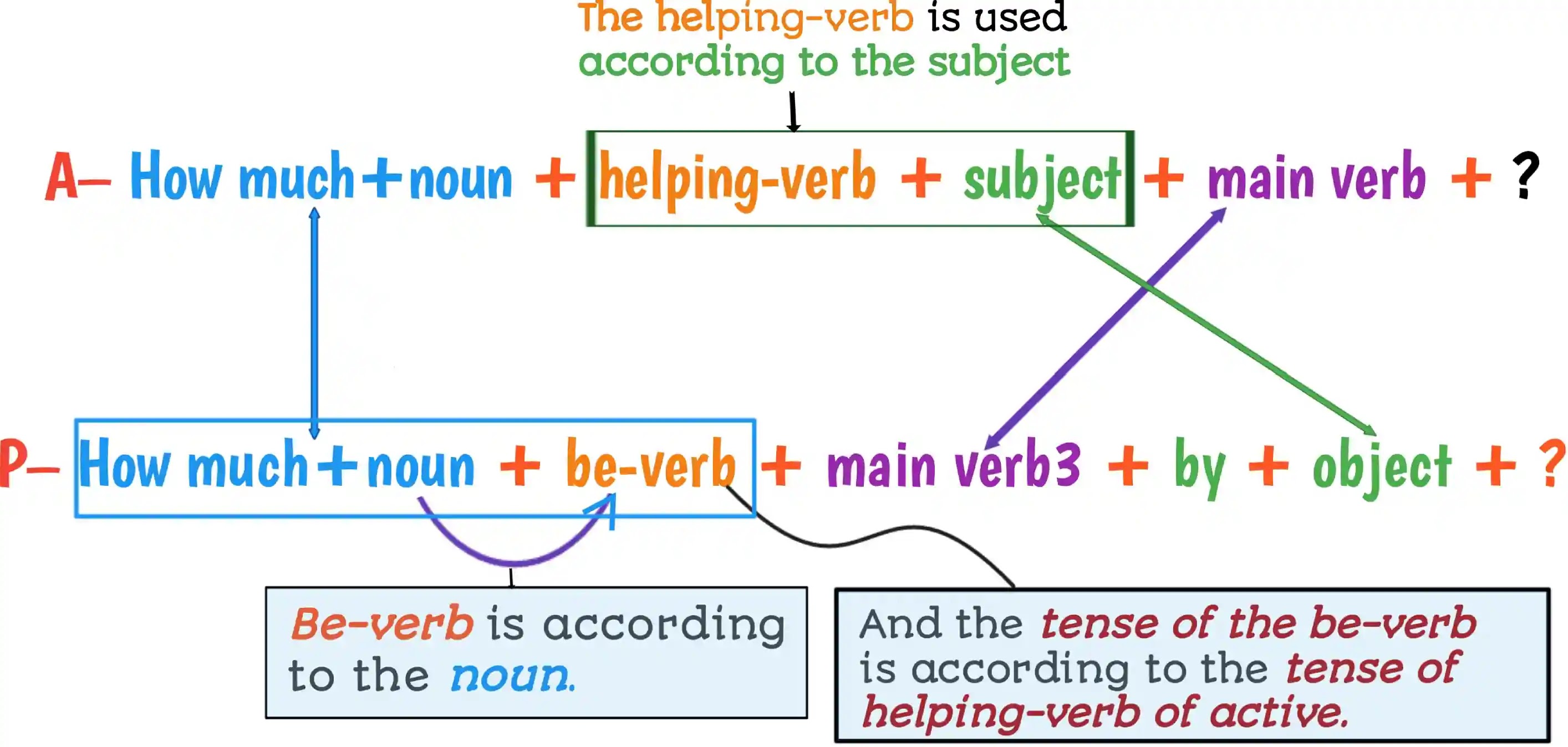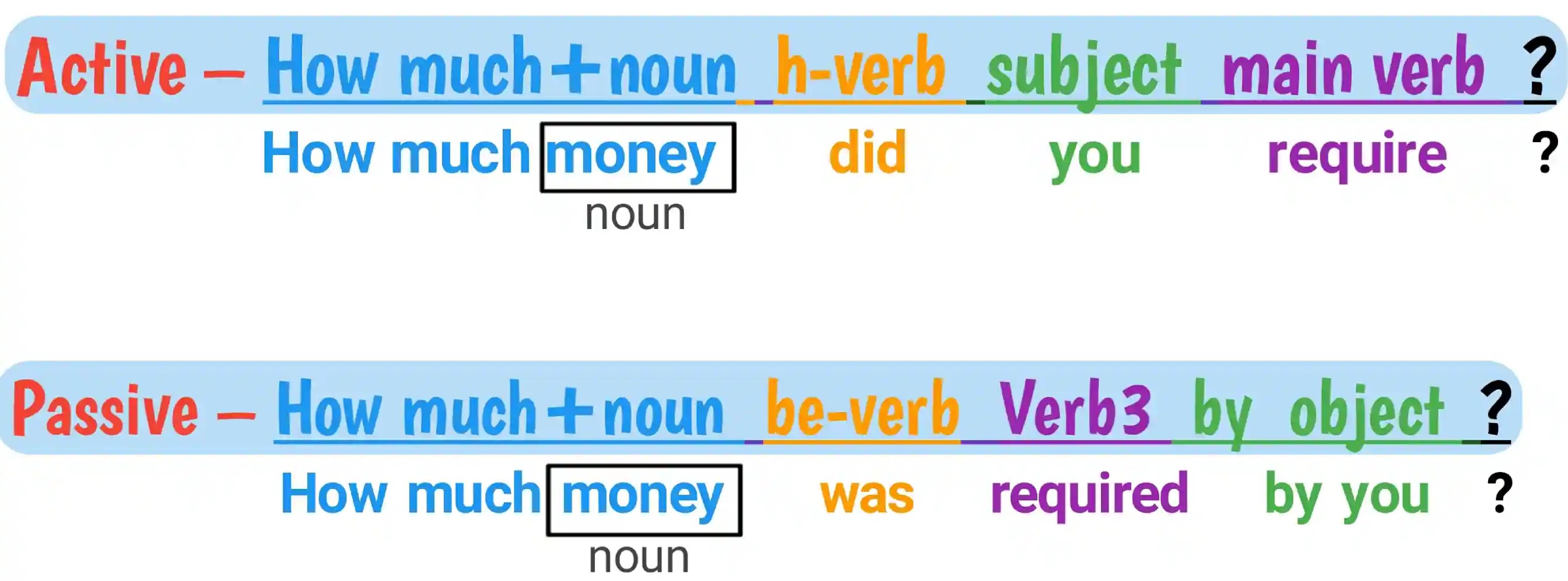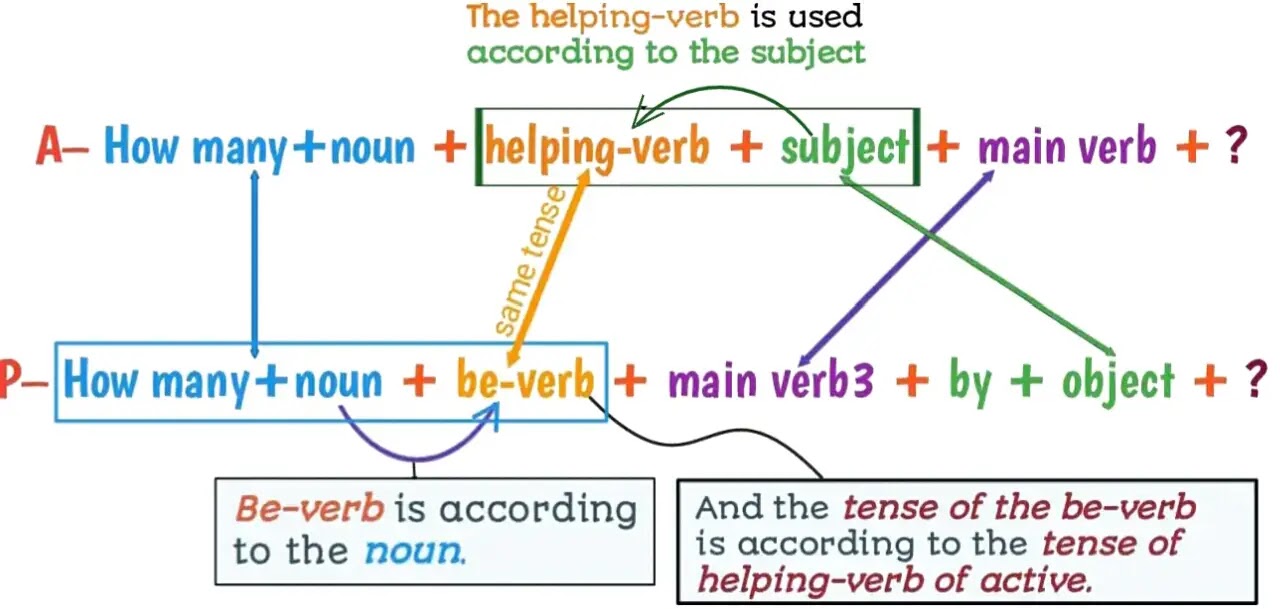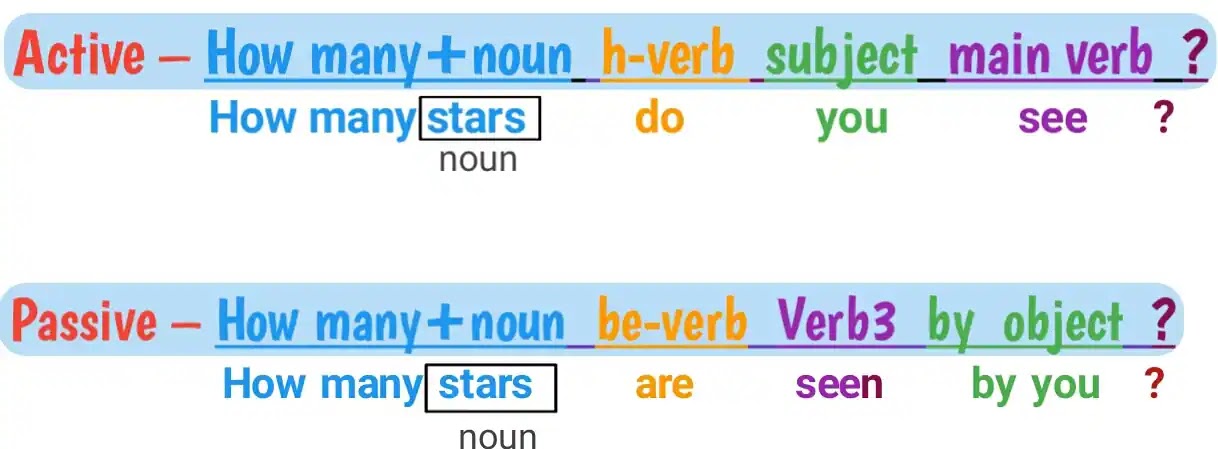Wondering how to change a wh question to passive voice?
Well,
In this article, you are going to learn changing the voice of a WH question.
The post is a bit lengthy. But once you complete reading, I am sure, you shall be a ‘master‘ in Voice change of WH Questions.
Table of Contents:
1. Voice change with ‘Who’
2. Voice change with ‘Whom’
3. Voice change with ‘What’
(i) Type I
(ii) Type II
4. Voice change with ‘When’
5. Voice change with ‘Why’
6. Voice change with ‘Where’
7. Voice change with ‘How’
8. Voice change with ‘How much’
9. Voice change with ‘How many’
10. Passive Voice of WH questions in different tenses
But before you move ahead, make sure that you have completed Farming Questions with WH words and the basic rules to change the voice.
Active and Passive Voice – WH Questions
Active and Passive Voice with Who:
Passive – By whom is cricket played?
How did it happen?
– in this sentence, who is the subject. Who will become the passive object. And the objective form of who is whom. Right?
So, with the passive voice, we’ll use by whom as the passive object.
You can change the voice of this wh question easily in 6 simple steps.
Steps to follow –
Step 1:
As usual, use the object of active as the subject of passive.Passive – “Cricket …”
Step 2:
Use a suitable be-verb after the passive subject.[Here the passive subject is ‘Cricket’ and a suitable be verb for this subject is ‘is’ or ‘was’.
But as the main verb is in present tense, you’ll use the present be verb ‘is’ here.]
Passive – “Cricket is…”
Wait…
“Cricket is…” Is this correct word order in an interrogative sentence?
No.
Because you are framing an interrogative sentence, you have to use the be-verb before the passive subject.
Passive – “Is cricket…”
Now it’s perfect.
Step 3:
Use 3rd form of the main verb after the subject.(– Here, played is the 3rd form of play.)
Passive – “Is cricket played…”
Step 4:
Use by + passive object after the verb.(– Here ‘whom’ will be the passive object.
‘who’ changes to ‘whom’, because ‘whom’ is the objective case for ‘who’. ‘Who’ is not used as the object, only ‘whom’ can be.)
Passive – “Is cricket played by whom…”
Step 5:
Use the question mark (?) at the end.Passive – “Is cricket played by whom?”
Is that all?
Wait,
Here is a problem. This passive voice “Is cricket played by whom?” begins with a be verb. The use of a be-verb at the beginning is a feature of a yes-no question. And a Wh-question must start with a WH word.
So, we have to follow one last step. That is –
Step 6:
Here the phrase ‘by whom’ should be used at the starting of the sentence.Passive – By whom is cricket played?
Here is the correct answer.
The picture below can explain it better:
Another passive is –
Who is cricket played by? – this sentence is also correct.
Examples:
Active – Who led the Army?
Passive – By whom was the Army led?
Active – Who made the idol?
Passive – By whom was the idol made?
Active – Who founded the Hindu College?
Passive – By whom was the Hindu College founded?
Active – Who discovered America?
Passive – By whom was America discovered?
Want to take mock tests?
Check our mock test series (Series 3).
Alright.
You see, all the examples above are affirmative.
Now let’s have a look at some negative examples.
For Negative Sentence the Structure is :–
Active – Who + do not/does not + verb + object + ?Passive – By whom + be verb + not + object of active + verb (3rd form) + ?
E.g.-
Active – Who doesn’t play chess?
Passive – By whom is chess not played?
Active – Who didn’t play chess?
Passive – By whom was chess not played?
The examples above are in indefinite tense.
You should see the examples in continuous and perfect tenses too.
Start with continuous tense.
‘Who’ in Continuous Tense :–
Structure:
Active – Who + be verb + (verb+ing) + object + ?
Passive – By whom + be verb + object of active + being + verb (3rd form)+ ?
Active – Who + be verb + (verb+ing) + object + ?
Passive – By whom + be verb + object of active + being + verb (3rd form)+ ?
E.g.-
Active – Who is singing a song?
Passive – By whom is a song being sung?
Active – Who were not reading books?
Passive – By whom were not books being read?
Passive – By whom were not books being read?
Read more: Conditional Sentences
‘Who’ in Perfect Tenses :–
Structure:
Active – Who + have verb + main verb (3rd form) + object + ?
Passive – By whom + have verb + object of active + been + verb (3rd form) + ?
Active – Who + have verb + main verb (3rd form) + object + ?
Passive – By whom + have verb + object of active + been + verb (3rd form) + ?
E.g.-
Active – Who have not submitted the project yet?
Passive – By whom has the project not been submitted yet?
Passive – By whom has the project not been submitted yet?
Active – Who has broken the glass?
Passive – By whom has the glass been broken?
Active – Who had performed the character of Macbeth?
Passive – By whom had the character of Macbeth been performed?
We have seen examples in past and present tense.
Some examples also from future tense –
E.g.-
Active – Who will not take pictures?
Passive – By whom will pictures not be taken?
‘Who’ in Future Indefinite :–
Structure:
Active – Who + shall/will + main verb + object + ?
Passive – By whom + shall/will + object of active + be + verb (3rd form) + ?
Active – Who + shall/will + main verb + object + ?
Passive – By whom + shall/will + object of active + be + verb (3rd form) + ?
E.g.-
Active – Who will not take pictures?
Passive – By whom will pictures not be taken?
‘Who’ in Future Continuous :-
Structure:
Active – Who + shall/will + be + (main verb+ing) + object + ?
Passive – By whom + shall/will + object of active + be + being + main verb (3rd form) + ?
Active – Who + shall/will + be + (main verb+ing) + object + ?
Passive – By whom + shall/will + object of active + be + being + main verb (3rd form) + ?
E.g.-
Active – Who will not be watching the movie?
Passive – By whom will the movie not be being watched?
‘Who’ in Future Perfect :-
Structure:
Active – Who + shall/will + have + (3rd form of main verb) + object + ?
Passive – By whom + shall/will + have + object of active + been + main verb (3rd form) + ?
Active – Who + shall/will + have + (3rd form of main verb) + object + ?
Passive – By whom + shall/will + have + object of active + been + main verb (3rd form) + ?
E.g.-
Active – Who will have said it before?
Passive – By whom will have it been said before?
Want PDF of this page?
Join our Telegram Channel.
Join our Telegram Channel.
Fine.
‘Who’part is complete.
Let’s move on to ‘Whom’ –
Active and Passive Voice of Whom
Did you know?
Who is used as the subject, Whom is used as the object in an interrogative sentence. The subjective case of ‘whom’ is ‘who’.
That’s why, ‘whom’ changes to ‘who’ when we change the voice.
Structure –
Active – Whom + helping verb + subject + main verb + ?
Passive – Who + be verb + V3 + by + subject (passive object) + ?
E.g.-
Active – Whom do you like?
Now turn it into passive.
Steps to follow –
Passive – “Who…”
Passive – “Who is/are…”
Passive – “Who is/are liked…”
Passive – “Who is/are liked by you?“
So, the final answer is –
Passive – Who is/are liked by you?
E.g.-
Active – Whom do you like?
Now turn it into passive.
Steps to follow –
Step 1:
Turn ‘whom’ into ‘who’ as ‘who’ is the subjective form of ‘whom’.Passive – “Who…”
Step 2:
Use a be verb after ‘who’.Passive – “Who is/are…”
Step 3:
Now put the third form of the main verb.Passive – “Who is/are liked…”
Step 4:
Use- by + passive object +?Passive – “Who is/are liked by you?“
So, the final answer is –
Passive – Who is/are liked by you?
Examples:
Active – Whom doesn’t he love?
Passive – Who is not loved by him?
Active – Whom did she choose?
Passive – Who was/were chosen by her?
Active – Whom will not they select?
Passive – Who will not be selected by them?
Read more: Important Phobias
Read more: Important Manias
‘Whom’ in Continuous Tense –
Active – Whom + be verb + subject + (main verb+ing) + ?
Passive – Who + be verb + being + main verb (3rd form) + by + passive object + ?
Passive – Who + be verb + being + main verb (3rd form) + by + passive object + ?
E.g.-
Active – Whom is John inviting?
Passive – Who is being invited by John?
Active – Whom were they teaching?
Passive – Who were being taught by them?
Active – Whom shall we be supporting?
Passive – Who will be being supported by us?
Active – Whom will you be scolding?
Passive – Who will be being scolded by you?
‘Whom’ in Perfect Tense –
Active – Whom + have verb + subject + main verb (3rd form) + ?
Passive – Who + have verb + been + main verb (3rd form) + by + passive object + ?
Passive – Who + have verb + been + main verb (3rd form) + by + passive object + ?
Active – Whom haven’t you given the pencils?
Passive – Who hasn’t been given the pencils by you?
Active – Whom hasn’t she insulted?
Passive – Who hasn’t been insulted by her?
After you complete reading this article, I suggest you to visit this page to practice .
There are two types of WH question starting in ‘What’ –
Active and Passive Voice of What
- Type I: ‘What’ when used as the subject.
- Type II: ‘What’ when used as the object.
Type I: When what is used as the subject of a WH question:
Like –Active – What motivates you?
In this sentence, ‘What’ plays the role of the subject.
(Like – Subject + Verb + Object = What + Verb + Object)
To turn it into a passive voice we have to follow the same steps as we did in case of ‘who’ .
Step 1:
As usual, use the object of active as the subject of passive.Passive – “You…”
Step 2:
Use a suitable be verb after the passive subject. But, because it is an interrogative sentence, you must use the be verb before the passive subject.Passive – “Are you…”
Step 3:
Use 3rd form of the main verb after the be-verb.Passive – “Are you motivated…”
(cut remains the same in all its three forms.)
Step 4:
Use by + passive object after the verb.Passive – “Are you motivated by what…”
Step 5:
Put the question mark (?) at the end.Passive – “Are you motivated by what?”
This passive voice “Are you motivated by what?” starts with a be-verb. The use of be verb at the beginning is a rule for yes-no questions. And, As you know, in case of wh questions, it must start with a wh word.
So, yoy have to follow one last step –
Step 6:
Place ‘by what’ at the beginning.Passive – By what are you motivated?
–The correct answer.
Other examples:
Active – What doesn’t help them?
Passive – By what are they not helped?
For a sentence of Continuous Tense, the structure is –
Active – What + be verb + (main verb +ing) + object + ?
Passive – By what + be verb + passive subject + being + main verb (3rd form) + ?
E.g.-
Active – What is annoying you?
Passive – By what are you being annoyed?
For a sentence of Perfect Tense, the structure is –
Active – What + have verb + main verb (3rd form) + object + ?
Passive – By what + have verb + passive subject + been + main verb (3rd form) + ?
E.g.-
Active – What has encouraged Jerry for this competition?
Passive – By what has Jerry been encouraged for this competition?
Active – What have not diverted her mind from study?
Passive – By what has her mind not been diverted from study?
Active – What had inspired her to be a doctor?
Passive – By what had she been inspired to be a doctor?
Active – What hadn’t stopped him to raise his voice?
Passive – By what hadn’t he been stopped to raise his voice?
Type II: When What is Used as the Object:
Active – What do you eat? – Make it passive.
[In this sentence, what is the object, while the subject is you]
Step 1:
Start with the WH word.
“What…”
Step 2:
Use a be-verb suitable for the WH word. (Actually a WH word is singular and plural both, so, any be-verb is correct here.)
“What is…” / “What are…”
Step 3:
Put the third form of the main verb.
“What is eaten…”
Step 4:
Use – by + you (passive object) + ?.
“What is eaten by you?”
Other examples:
Active – What doesn’t he demand?
Passive – What is not demanded by him?
Active – What is Ravi cutting?
Passive – What is being cut by Ravi?
Active – What have you done?
Passive – What has been done by you?
Active – What will she take?
Passive – What will be taken by her?
Active – What will not they do?
Passive – What will not be done by them?
Active – What shall we eat?
Passive – What shall be eaten by us?
Active – What will not he say?
Passive – What will not be said by him?
Active – What shall we be writing?
Passive – What will be being written by us?
Active – What will you be doing?
Passive – What will be being done by you?
Read more: Change the narration of WH questions.
What is complete.
Step 1:
Start with the WH word.
“What…”
Step 2:
Use a be-verb suitable for the WH word. (Actually a WH word is singular and plural both, so, any be-verb is correct here.)
“What is…” / “What are…”
Step 3:
Put the third form of the main verb.
“What is eaten…”
Step 4:
Use – by + you (passive object) + ?.
“What is eaten by you?”
Other examples:
Active – What doesn’t he demand?
Passive – What is not demanded by him?
Active – What is Ravi cutting?
Passive – What is being cut by Ravi?
Active – What have you done?
Passive – What has been done by you?
Active – What will she take?
Passive – What will be taken by her?
Active – What will not they do?
Passive – What will not be done by them?
Active – What shall we eat?
Passive – What shall be eaten by us?
Active – What will not he say?
Passive – What will not be said by him?
Active – What shall we be writing?
Passive – What will be being written by us?
Active – What will you be doing?
Passive – What will be being done by you?
Read more: Change the narration of WH questions.
What is complete.
For every WH word hereafter, you’ll find that the structures are quite similar –
Active and Passive Voice of When :
Active – When do you read books?
Passive – When are books read by you?
Active – When will she take medicine?
Passive – When will medicine be taken by her?
Active – When will not they attend the prayer?
Passive – When will the prayer not be attended by them?
Active – When is Ravi writing the letter?
Passive – When is the letter being written by Ravi?
Active – When shall we start the meeting?
Passive – When will the meeting be started (by us)?
Active – When shall we be watching movies?
Passive – When will movies be being watched?
Active – When will Rafiq have told them everything?
Passive – When will have everything been told by Rafiq.
Active and Passive Voice of Why :
Active – Why do you read books?Passive – Why are books read by you?
Active – Why did you send him?
Passive – Why was he sent by you?
Active – Why did they spread the rumour?
Passive – Why was the rumour spread (by them)?
Active – Why are they decorating the hall?
Passive – Why is the hall being decorated by them?
Active – Why is not he drinking milk?
Passive – Why is milk not being drunk by him?
Active – Why was she buying chicken?
Passive – Why was chicken being bought by her?
Active – Why have you made that silly mistake?
Passive – Why has that silly mistake been made by you?
Active – Why hasn’t she accepted your offer?
Passive – Why hasn’t your offer been accepted by her?
Active – Why will she take medicine?
Passive – Why will medicine be taken by her?
Also Read: 150+ examples of voice changing of WH questions.
Where :
Active – Where do you read books?
Passive – Where are books read by you?
Active – Where did you send him?
Passive – Where was he sent by you?
Active – Where didn’t they spread the rumour?
Passive – Where wasn’t the rumour spread (by them)?
Active – Where are they building a hospital?
Passive – Where is the hospital being built by them?
Active – Where is not she teaching History?
Passive – Where is History not being taught by her?
Active – Where was she buying chicken?
Passive – Where was chicken being bought by her?
Active – Where have you made that silly mistake?
Passive – Where has that silly mistake been made by you?
Active – Why hasn’t she thrown the stone?
Passive – Why hasn’t the stone been thrown by her?
How :
Active – How do you read books?
Passive – How are books read by you?
Active – How did you send him?
Passive – How was he sent by you?
Active – How shall we start the meeting?
Passive – How will meeting be started (by us)?
Active – How is Mahi writing the letter?
Passive – How is the letter being written by Mahi?
Active – How was she buying chicken?
Passive – How was chicken being bought by her?
Active – How will you not be teaching the students?
Passive – How will the students not be being taught by you?
Active – How have you made that silly mistake?
Passive – How has that silly mistake been made by you?
Active – How will Sheamus have shown his progress report phone?
Passive – How will have his progress report been shown by Sheamus.
How Much:
We use how much to ask about the quantity of an uncountable noun.
Structure:
Active – How much + noun + helping verb + subject + main verb + ?
In this sort of sentences, how much / how many + noun is the object.
E.g. –
Active – How much money did you require?
Passive – ???
Remember that how much money is the object here (money is that noun). So, make it the subject of the passive.
Step 1:
Put the passive subject
Passive – How much money…
Step 2:
Put a be verb suitable for the passive subject.
Passive – How much money was …
Step 3:
Put the 3rd form of the main verb.
Passive – How much money was required…
Step 4:
Use the active subject as the passive object with a by before it. Also put a question mark.
Passive – How much money was required by you?
More examples:
Active – How much oil does the dish require?
Passive – How much oil is required for the dish?
Active – How much money have you spent to buy the t-shirt?
Passive – How much money has been spent by you to buy the t-shirt?
Active – How much milk has your father sell this month?
Passive – How much milk has been sold by your father this month?
Active – How much distance did you cover on foot today in the morning?
Passive – How much distance was covered on foot by you today in the morning.
On foot means walking.
Active – How much electricity will it generate?
Passive – How much electricity will be generated by it?
Active – How much water can the dam store?
Passive – How much water can be stored by/in the dam?
Active – How much might she need?
Passive – How much money is needed by her?
How Many:
We use how many to ask about the quantity of a countable noun.
You cannot express the verbs in sentences like How many students participated in the annual sports? in passive voice. If How many + noun is the object, then only the passive voice of the verb is possible.
Below I’ve explained the structures of active and passive voice of how many. It is as same as the questions with how much.
As in, How many stars do you see?, How many stars is the object. The subject is you. The verb is do…see.
Now reqrite the sentence using the passive voice of the verb:
The steps are the same as those of how much.
Step 1:
Start the sentence with the passive subject.
Put the active object as the passive subject. The active object is How much money.
Passive – How many stars…
Step 2:
Put a be verb suitable for the passive subject and the tense of the active verb.
The passive subject how much stars is plural. and the tense of the verb (do you see) is present. So, use a plural be verb of present tense i.e. are.
Passive – How many stars are …
Step 3:
Put the 3rd form of the main verb.
The main verb in active voice is see. Its 3rd form is seen.
Passive – How many stars are seen…
Step 4:
Use the active subject as the passive object with a by before it. Also put a question mark.
The active subject is you. Make it object of the passive verb.
Passive – How many stars are seen by you?
More examples:
Active – How many chocolates do you eat a day?
Passive – How many chocolates are eaten a day by you?
Active – How many ppt files did Aman prepare?
Passive – How many ppt files were prepared by Aman?
Active – How many tickets are you buying?
Passive – How many tickets are being bought by you?
Active – How many matches have you played?
Passive – How many matches have been played by you?
Active – How many mails has she written today?
Passive – How many have been written by her today?
Active – How many laptops can you target to sell this month?
Passive – How many laptops can be targeted to be sold by you this moth?
Active – How many toys shall we make?
Passive – How many toys will be made by us?
Active – How many oranges will she take?
Passive – How many oranges will be taken by her?
Now we are going to discuss voice change for why, where, when, how in different tenses: –
Active and Passive Voice of WH Questions –
In Indefinite Tenses:
Active – WH + do (do verb) + subject + verb + object + ?
Passive – WH + am/is/are/was/were (as suitable for passive subject) + passive subject (object of active) + main verb (3rd form) + by + passive object (subject of active) + ?
Examples:
Active – When do you play chess?
Passive – When is chess played by you?
Active – Why did she read books?
Passive – Why were books read by her?
In case of Future Indefinite Tense:
Active – WH + Shall/will + subject + verb + object + ?Passive – WH + shall/will (as suitable for passive subject) + passive subject (object of active) + be + main verb (3rd form) + by + passive object (subject of active) + ?
Active – When will she take medicine?
Passive – When will medicine be taken by her?
Active – How will not they attend the prayer?
Passive – How will the prayer not be attended by them?
In Continuous Tenses:
Active – WH + be verb + subject + (verb+ing) + object + ?
Passive – WH + am/is/are/was/were (as suitable for passive subject) + passive subject (object of active) + being + main verb (3rd form) + by + passive object (subject of active) + ?
Examples:
Active – How is Kamal writing the letter?
Passive – How is the letter being written by Kamal?
Active – Why was he buying art-papers?
Passive – Why were art-papers being bought by him?
In case of Future Continuous Tense:
Active – WH + shall be / will be + subject + (verb+ing) + object + ?Passive – WH + Shall / will (as suitable for passive subject) + passive subject (object of active) + be + being + main verb (3rd form) + by + passive object (subject of active) + ?
Examples:
Active – Why will you be teaching the students?
Passive – Why will the students be being taught by you?
Active – Why will Peter be wasting his time?
Passive – Why will his time be being wasted by Peter?
In Perfect Tenses:
Active – WH + has/have/had (have verb) + subject + (verb+ing) + object + ?
Passive – WH + has/has/had (as suitable for passive subject and tense) + passive subject (object of active) + been + main verb (3rd form) + by + passive object (subject of active) + ?
Active – Why have you made this silly mistake?
Passive – Why has this silly mistake been made by you?
Active – When had they promoted her?
Passive – When had she been promoted (by them)?
That’s it,
Now you know all about passive voice wh questions.
Now if you want to know how your progress is so far,
Visit this page to practice 20 MCQs on this chapter .
And
I’ve choosen for you 60 exercises on voice changing of wh questions.
Let’s practice.
Thank you…

